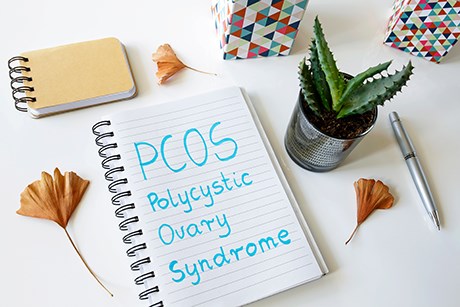Polycystic ovary syndrome (PCOS) and polycystic ovaries (PCO) are conditions characterised by cysts in the ovaries. PCOS also presents with hormone imbalance in women and among other symptoms can cause irregular cycles and a difficulty conceiving. PCOS causes ‘follicular arrest’, so that while many eggs begin to develop, they stop growing while they are still too small and immature to be released.

Polycystic Ovary Syndrome (PCOS)
Polycystic Ovary Syndrome (PCOS)
What causes PCOS?
The exact cause of PCOS is unknown but it is thought to be down to a combination of genetic and environmental factors. One theory is that women with PCOS are resistant to insulin, not absorbing it properly, and that the excess of insulin in the blood causes the ovaries to release too much testosterone. PCOS is also associated with imbalances in other hormones such as sex hormone binding globulin (SHBG) and lutenising hormone (LH).
What are PCOS symptoms?
The excess release of androgens (male hormones) in PCOS can lead to side effects such as hair growth, weight gain and acne as well as irregular menstrual cycles. A doctor will usually ascertain whether you are likely to have PCOS by asking about your medical history and giving you a physical examination. They also usually take blood tests to check the hormone levels in the blood, and may ask you to have a scan to check the ovaries for cysts.
There is no cure for PCOS, but it can be managed. For example lifestyle choices such as losing weight can reduce symptoms and improve PCOS. Taking birth control pills often helps with the symptoms of PCOS, as well as anti-androgen medication.
How does PCOS affect fertility?
The imbalance of hormones is key to why PCOS leads to infertility. Because the ovaries are not receiving the correct level of hormones they are unable to develop the eggs to maturity, and so ovulation does not take place and the follicle may remain as a cyst. The excess amounts of androgens (male hormones) released by the body also affect the way eggs are developed and released.
Blogs and stories
Read that latest stories, advice and news from the CREATE Fertility blog
PCOS & IVF treatment
To treat infertility specifically, fertility medication can be given to stimulate ovulation, although this can increase the risk of multiple births. The other option is to undergo in-vitro fertilisation (IVF), where the maturation of eggs is encouraged in a controlled environment. Once the eggs have been collected they can be fertilised outside the body before being replaced in the womb.
The good news is that women with PCOS generally respond well to IVF treatment. In fact the greatest problem with these patients is that they can respond too well to stimulation, which puts them at risk of Ovarian Hyperstimulation Syndrome (OHSS). This is a potentially dangerous condition caused by overstimulation of the ovaries which causes them to swell and leads to a variety of symptoms.
At CREATE many PCOS patients are treated with our Mild Stimulation protocols, which include 5-9 days worth of stimulating drugs rather than the 4-5 weeks worth used in conventional IVF. This approach has the benefit of largely avoiding the severest risks of OHSS and in addition, this lighter regimen also has the added advantage of leaving the body less stressed and hopefully more receptive to implantation.

